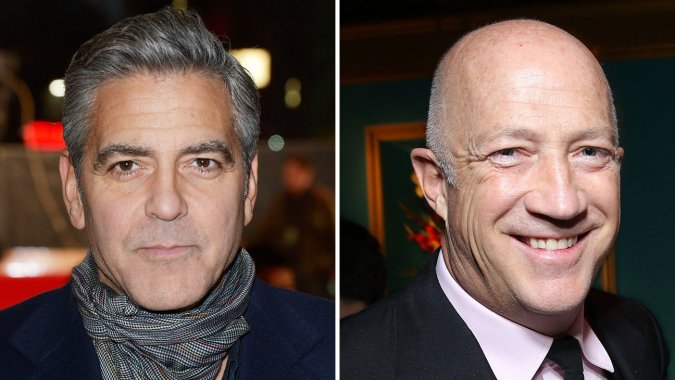
Reps for five studios tell The Hollywood Reporter that their top executives never received Clooney’s petition, which the actor cited in a diatribe last week against Hollywood for remaining silent as Sony faced the fallout from an epic cyberattack that culminated with the studio initially canceling the theatrical release of The Interview.
On Dec. 18, Clooney told the industry blog Deadline that he and his agent, CAA’s Bryan Lourd, circulated a petition to the industry’s top powerbrokers and not a single person would sign. According to that story, Clooney and Lourd took the petition to the top people in film, TV, music and other segments of the entertainment industry.
But reps for Disney, 20th Century Fox, Universal, Warner Bros. and Lionsgate as well as fellow talent agencies WME and UTA, now say that top executives at their respective companies were never approached by Clooney or Lourd. Paramount did not respond to repeated requests for comment, but sources say top execs including studio head Brad Grey were never asked to sign a Clooney/Lourd petition either.
“I never heard of it until I saw press about a petition not getting signed,” says one studio head, who asked to remain anonymous. “No one I know has heard of it. We were just discussing that, of course, we would’ve signed it, but we had never heard of it, and these were a lot of high-level industry people.”
Clooney offers a different version of events, though, telling THR, “Bryan Lourd and I were sent a letter from the head of the MPAA Chris Dodd, which was to be circulated to the studios. It didn’t ask for support for the release of the film in the face of threats, so we wrote a new letter and sent it to the MPAA. Over the next 24 hours, Bryan asked several people to sign on to the petition. One said he would if others did, [and] the rest said, flat-out, ‘No.’ Chris Dodd told Bryan that he had no takers either.”
The MPAA declined to comment, but a source was unaware of a revised version of the MPAA letter having been drafted for a wider petition.
In his earlier interview with Deadline, Clooney had said, “[The petition] was sent to basically the heads of every place. They told Bryan Lourd, ‘I can’t sign this.’ What? How can you not sign this? I’m not going to name anyone, that’s not what I’m here to do, but nobody signed the letter, which I’ll read to you right now.”
He then went on to read from the short petition, which included the following passage: “This is not just an attack on Sony. It involves every studio, every network, every business and every individual in this country. That is why we fully support Sony’s decision not to submit to these hackers’ demands. We know that to give in to these criminals now will open the door for any group that would threaten freedom of expression, privacy and personal liberty.”
Reps for several studios say they were approached by Sony Pictures Entertainment CEOMichael Lynton to sign on to an MPAA-backed letter, but that letter was completely different than the petition Clooney described in his interview, according to those familiar with the MPAA letter, and was ultimately untenable because it contained binding language.
“As I read [Clooney’s petition], I thought, ‘That makes a lot of great points. That’s something we could sign,’” says another high-ranking executive. “But we were never approached by Clooney or Lourd.”
The distinction is significant because Clooney’s comments and his petition have been cited widely as evidence that the Hollywood community is not sympathetic to Sony’s situation.
When told of the studios’ contention that they had not seen his letter, Clooney told THR, “I’m not going to be baited into naming names. If The Hollywood Reporter has a list of heads of studios that would sign on in support of the release of this film then they should in fact get them to start a petition.”
Sony on Tuesday made The Interview available to a coalition of independent theaters to show. Rival studios still have not issued statements of support for Sony or the film.
Despite Clooney’s stance that Hollywood failed to support the studio in its time of need, several high-profile players such as Aaron Sorkin and Judd Apatow publicly backed embattled SPE co-chairman Amy Pascal and the studio, particularly at the most critical time for Sony — when Pascal was reeling from embarrassing leaked emails.
CAA declined to comment.
Hollywood Reporter

Leave a Reply
You must be logged in to post a comment.